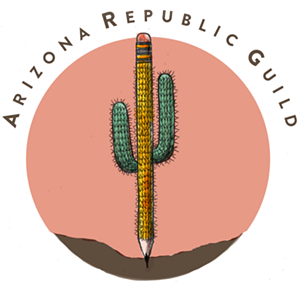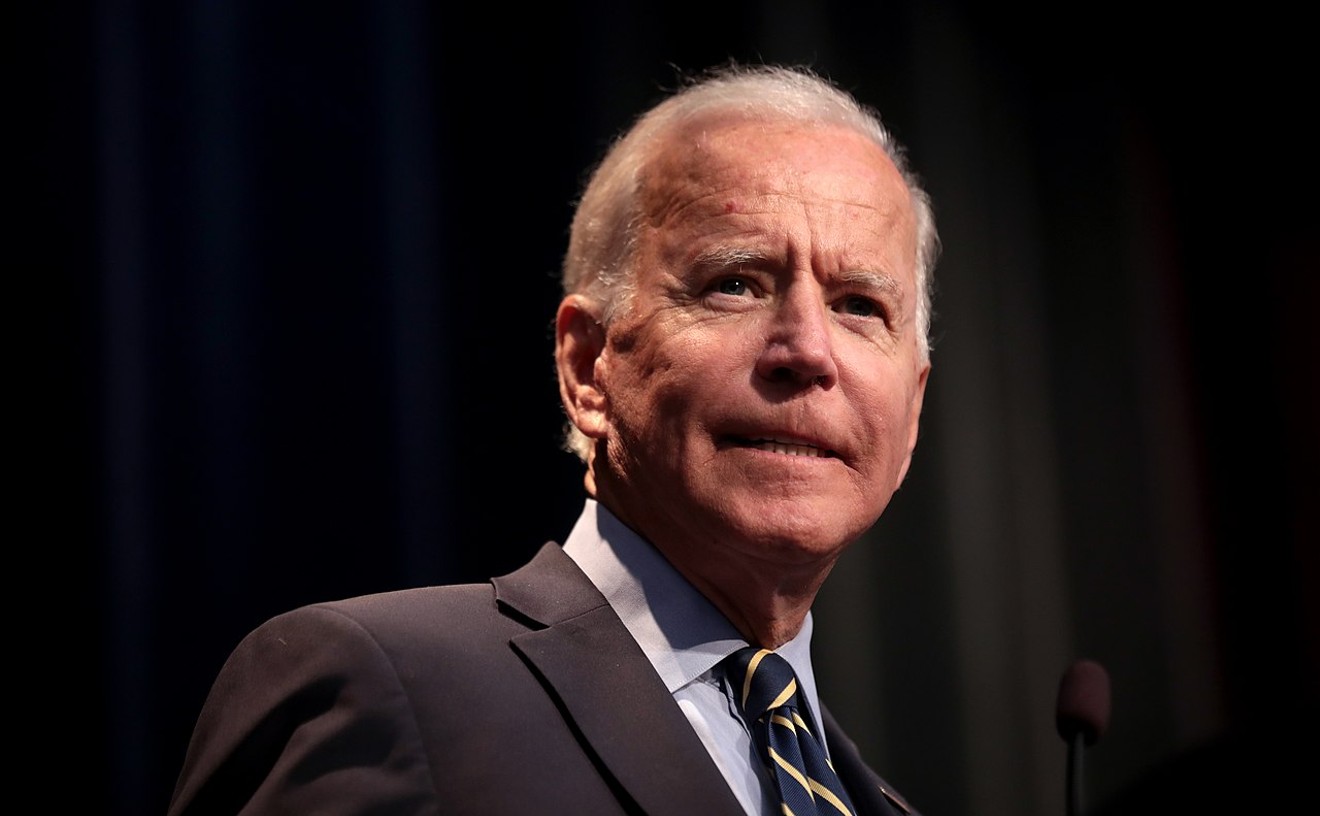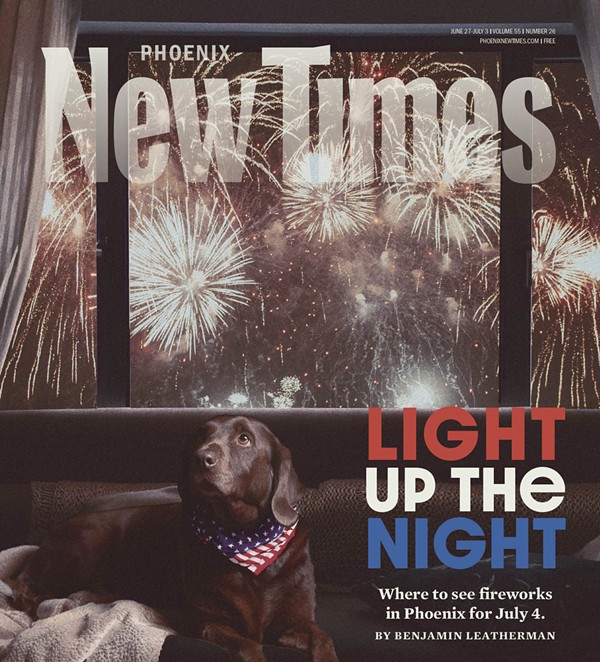Employees of the Arizona Republic officially declared their intention to form a union Wednesday, setting up a likely battle between journalists and corporate executives as the newspaper's parent company plans a merger that will almost certainly result in cuts.
Newsroom staffers signed union cards with the National Labor Relations Board saying they want to be represented by The NewsGuild-CWA, which has helped organize several media organizations in recent years. Union supporters plan to place copies of a mission statement on every newsroom desk, along with stickers and pins.
The announcement comes days after the Republic's top editor sent newsroom employees a bizarre email vaguely accusing union organizers of "surveilling colleagues" and comparing supporters with "crackpots and criminals." Press coverage of the email led two senior reporters to lob similar accusations of "surveillance," which organizers characterized as an overblown reaction to the common union practice of gauging support for their effort.
Tensions escalated again Tuesday, the day after Labor Day, when a Gannett representative reportedly confiscated the work phone of one of the union organizers, veteran reporter Rebekah Sanders.
The public launch also arrives as the Republic's parent company, Gannett, finalizes a merger with GateHouse Media. The deal, worth more than $1 billion, stands to create the largest newspaper conglomerate in the United States. Gannett owns the USA Today Network, while GateHouse has been steadily buying up newspapers across the country.
Corporate executives from both companies will benefit from the deal, but journalists face uncertainty as the proposed media behemoth plans to make $300 million in annual cuts. In the week after announcing the merger, GateHouse laid off more than two dozen journalists across 10 papers, and the company has taken out a $1.8 billion loan to help pay for the acquisition.
Staffers organized under the banner of the Arizona Republic Guild emphasized the merger in a mission statement explaining why they want a union. The statement noted that Gannett has reduced the size of the paper's editorial staff by 70 percent since 2007.
"The company’s merger with GateHouse Media likely means deeper cuts,” the mission statement reads. “Annual layoffs, stagnant salaries, swelling healthcare costs and high turnover weaken local journalism. Our newsroom needs a large, diverse staff to tell the stories of our community. Our newsroom needs a seat at the table.”
Gannett has the option of voluntarily recognizing a union for its Arizona-based journalists. If the company refuses, as is likely, employees would vote in roughly four weeks on whether to form a collective bargaining unit. Organizers declined to say how many of the paper's roughly 100 editorial staffers support unionization.
Richard Ruelas, a 25-year veteran of the Republic, wrote in a statement that a union could offer workers some protections as they face uncertain futures under Gannett-GateHouse ownership.
“We can't be sure that whatever company owns us will care about journalism. But we can work to make sure they provide some basics for journalists,” Ruelas said. “It took me a while to stop thinking about what was in this for me, and start thinking about what was in this for all of us.”
Wednesday marked the official union announcement, but the Republic's organizing drive has not been a secret by any means. Public relations professional Matthew Benson, a former Republic reporter, broke the union drive's cover in July, calling the effort the "biggest untold story in Arizona media."
And on August 30, Republic Executive Editor Greg Burton made headlines after sending a newsroom-wide email accusing organizers of "surveilling" co-workers who opposed unionization.
Burton's email, which was published by Phoenix New Times and HuffPost, compared union supporters with "crackpots and criminals," alluding to a number of distasteful characters covered by the paper, including: Bobby Wilson, a former state senate candidate who killed his mother, Brittany Zamora, a teacher convicted of child molestation, and Sue Black, the former Arizona State Parks director who oversaw the unsanctioned bulldozing of native antiquities sites.
"These are the types who surveil journalists," Burton wrote. "Journalists don’t surveil other journalists."
Burton's email also contained a thinly veiled threat to discipline employees who engage in the alleged "surveillance" of co-workers. "Any such conduct will be addressed through disciplinary channels," he wrote.
When questioned by New Times last week, Burton said, "The email speaks for itself, and we do not comment on personnel matters."
Coverage of Burton's email resulted in public criticism of unionizing from two of the Republic's most senior reporters. Investigative reporter Craig Harris accused his co-workers of using a "secret app" to "document via text messages the real time movements of me and my colleagues who had reservations about the union effort."
Congressional delegation reporter Yvonne Wingett Sanchez accused organizers of "logging" her "movements" and "facial expressions during meetings," saying that union supporters have created a "toxic work environment." Wingett Sanchez declined to elaborate on her allegations, telling New Times, "My tweets speak for themselves."
Maria Polletta, a Guild organizer who covers state politics for the Republic, said the allegations of surveillance refer to text messages sent between union supporters noting that some senior employees had invited co-workers to discuss disagreement with unionizing outside the office.
"When Gannett is forcing everyone to attend mandatory meetings on all the reasons a union is a terrible idea and employees are suddenly being taken to coffee and questioned about how they feel about their jobs, it’s important to check in with your coworkers," Polletta wrote in an email. "We tried to gauge how people were responding to captive-audience meetings and other tactics so we could follow up and address any questions, especially after other newsrooms who’d recently unionized told us Gannett was taking a particularly aggressive approach."
Polletta added: "Feedback over the past week has helped us reflect on how we could more sensitively respond to the company’s union-busting, but we certainly have not been and will not be placing anyone under 'surveillance.' I couldn’t produce a detailed log of anyone’s comings and goings if my life depended on it."
Harris declined to comment on his tweets.
"I don't want to talk about it any more," Harris said in a phone call. "I will let my tweets speak for what they are."
He praised Gannett and touted some of the benefits offered to Republic employees, including three weeks paid time off for entry-level employees and a dollar-for-dollar matching 401(k) plan. Harris noted that several Republic staffers have recently received "8 to 12 percent" raises.
"I just think we've been treated well here," he said. "I like working here. I like my colleagues."
Asked whether he has any concerns about the GateHouse merger, Harris said: "I don't worry about it because I don't worry. I'm not anxious. I come to work. I do good work. We'll see what happens."
Friday, Harris criticized fellow investigative reporter Sanders on Twitter in relation to the alleged surveilling. Tuesday, Sanders said on Facebook that a Gannett representative "interrogated" her about her "unionizing activity." Afterward, Sanders said, the representative confiscated her work phone.
"I asked how I would conduct interviews the rest of the day. She said, 'You won't.' I asked when I could have it back," Sanders wrote in a public Facebook post. "She said she would let me know. My work cell has all of my contacts and is an integral part of my job."
As for the raises Harris mentioned, Sanders said they came in response to the union drive.
"Those were not raises that were planned," Sanders said. "Those were raises that we won." She added that Gannett has made no promises that employees would keep their benefits after the merger with GateHouse.
Republic employees started to talk about unionizing in January, shortly after Gannett laid off journalists at several of its newspapers across the country. Two Republic employees lost their jobs, including Pulitzer Prize-winning cartoonist Steve Benson, who designed the Republic Guild's logo.
When management caught wind of the effort in June, Gannett executives began a counter-campaign to dissuade employees from unionizing.
Gannett and Republic bosses have held three all-hands-on-deck meetings with the newsroom, according to organizers. USA Today Network president Maribel Wadsworth, former Republic editor-in-chief Nicole Carroll (who currently serves as the top editor for USA Today), and Burton have all been present for these so-called "captive audience" meetings.
During one of the meetings, organizers said, Maribel referenced materials from internal emails sent between union supporters, which struck union supporters as ironic, given the accusations of "surveillance" by Burton and senior reporters.
Bosses have also held one-on-one meetings with workers to discourage them from unionizing.
In some ways, the union drive already has won concessions from management. According to organizers, Republic leadership shared the company's pay scale with employees after they learned of the effort.
The Republic's organizing drive launched amid a renaissance of media unions.
Plummeting digital revenue, due in part to online classifieds and the rise of social media, have led newspapers to slash budgets and cut journalism jobs. Online media organizations, which many hoped would save the industry, have struggled to find a sustainable business model.
The instability has contributed to a wave of newsrooms organizing, including traditional papers like the Los Angeles Times and the Chicago Tribune, as well as primarily digital outlets like BuzzFeed, Vox, and VICE.
[
{
"name": "Air - MediumRectangle - Inline Content - Mobile Display Size",
"component": "18478561",
"insertPoint": "2",
"requiredCountToDisplay": "2",
"watchElement": ".fdn-content-body",
"astAdList": [
{
"adType": "rectangle",
"displayTargets": "mobile"
}
]
},{
"name": "Editor Picks",
"component": "16759093",
"insertPoint": "4",
"requiredCountToDisplay": "1",
"watchElement": ".fdn-content-body",
"astAdList": [
{
"adType": "rectangle",
"displayTargets": "desktop|tablet"
},{
"adType": "rectangle",
"displayTargets": "desktop|tablet|mobile"
}
]
},{
"name": "Inline Links",
"component": "17980324",
"insertPoint": "8th",
"startingPoint": 8,
"requiredCountToDisplay": "7",
"maxInsertions": 25
},{
"name": "Air - MediumRectangle - Combo - Inline Content",
"component": "16759092",
"insertPoint": "8th",
"startingPoint": 8,
"requiredCountToDisplay": "7",
"maxInsertions": 25,
"watchElement": ".fdn-content-body",
"astAdList": [
{
"adType": "rectangle",
"displayTargets": "desktop|tablet"
},{
"adType": "rectangle",
"displayTargets": "desktop|tablet|mobile"
}
]
},{
"name": "Inline Links",
"component": "17980324",
"insertPoint": "8th",
"startingPoint": 12,
"requiredCountToDisplay": "11",
"maxInsertions": 24
},{
"name": "Air - Leaderboard Tower - Combo - Inline Content",
"component": "16759094",
"insertPoint": "8th",
"startingPoint": 12,
"requiredCountToDisplay": "11",
"maxInsertions": 24,
"watchElement": ".fdn-content-body",
"astAdList": [
{
"adType": "leaderboardInlineContent",
"displayTargets": "desktop|tablet"
},{
"adType": "tower",
"displayTargets": "mobile"
}
]
}
]











